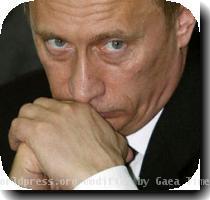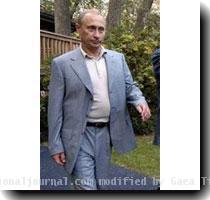Russia’s Medvedev urges economic modernization in state-of-the-nation address
By Lynn Berry, APThursday, November 12, 2009
Medvedev urges modernization of Russian economy
MOSCOW — President Dmitry Medvedev laid out his plan Thursday to move Russia’s economy into the modern age and overcome the grim industrial legacy of the Soviet Union.
In his annual state-of-the-nation address, he took a few digs at Vladimir Putin, his predecessor and mentor, but made clear that the tightly controlled political system Putin created is here to stay.
Medvedev warned the opposition that any attempts to upset the current order will not be tolerated.
He ordered a sweeping modernization of the Soviet-built military arsenals. But he also called for a “pragmatic” foreign policy aimed at attracting investment and improving living standards, rather than “chaotic actions driven by nostalgia and prejudice.”
“We mustn’t puff out our chest,” he said. “We are interested in the flow of capital, new technologies and modern ideas.”
Putin’s foreign policy was aimed at restoring Soviet-era global clout, and the often belligerent tone alarmed the West.
Putin, now prime minister, sat in the front row Thursday as Medvedev spoke to hundreds of parliament members, officials and religious leaders in an ornate Kremlin hall. As the president exceeded the 90 minutes allotted for the address, Putin was caught on camera staring at the ceiling.
As in the past, Medvedev avoided direct criticism of Putin, still seen as the more powerful figure. But he criticized parts of Putin’s legacy, including an inflated state role in the economy.
Medvedev said Russia can no longer afford to rely on an aging Soviet industrial base and to draw most of its revenues from exports of oil and gas, while trusting its security to Soviet-built nuclear arsenals.
“The nation’s prestige and welfare can’t depend forever on the achievements of the past,” he said.
Russia needs to focus on innovation, including research on new nuclear reactors and space technologies, and think about preparing for flights to other planets, Medvedev said.
He ordered the armed forces next year to commission 30 intercontinental ballistic missiles, three nuclear submarines and several dozen combat aircraft, among other new weapons. The number represents a large increase compared to past years.
Medvedev said the global economic downturn had hit Russia more severely than other countries, but he refused to shift the blame to the United States as Putin has done.
“We shouldn’t be looking for the guilty party abroad,” Medvedev said. “We have to acknowledge that in past years we didn’t do enough ourselves to resolve the problems we inherited.”
The oil- and gas-driven economy was hit hard as commodities prices plunged late last year. Russia emerged from recession in September — months after its European neighbors — with its gross domestic product still 9.4 percent below year-earlier levels.
While Putin methodically increased the state role in the economy during his eight-year presidency, Medvedev said Thursday that Russia needs to reduce the role of the state, which now controls up to 40 percent of the economy.
He singled out a key part of Putin’s legacy — giant state corporations that have been granted broad privileges and been widely criticized as inefficient. “I believe this form has no future in the long term,” Medvedev said.
He repeated his support for democracy and called for an “honest competition” of ideas. But he also suggested he shared Putin’s intolerance for dissent.
Medvedev said Russia’s political system had stabilized with the four parties voted into the Kremlin-controlled parliament having “withstood the test of time.”
“I want to underline: The strengthening of democracy does not mean a weakening of law and order,” he said. “Any attempts under democratic slogans to shake the situation, to destabilize the state, to split society, will be stopped.”
Opposition leaders were critical.
“Nothing will come of Medvedev’s plans because modernization has to start with a change of political system, the destruction of Putin’s corrupt centralized system of power,” Boris Nemtsov wrote in a blog.
Mikhail Kasyanov, a former prime minister, said in his blog that Medvedev’s message was clear: “There will be no changes in the country.”
Putin chose the younger Medvedev as his successor with the apparent mandate to present a more liberal face within Russia and abroad. Speculation occasionally arises of a split, but Putin’s spokesman Dmitry Peskov said this week that he has never seen or heard about any disagreements between them.
“They are quite comfortable in their tandem,” Peskov said. “Their coordination … is on a day-to-day, even sometimes hour-to-hour basis.”
Associated Press Writers Vladimir Isachenkov and Nataliya Vasilyeva contributed to this report.
Tags: Eastern Europe, Europe, Foreign Policy, Moscow, Russia, Vladimir Putin

